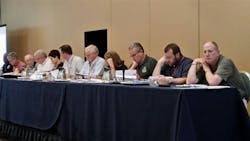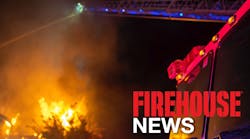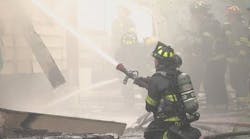A change in safety culture and a central data repository are among the common themes that emerged in the National Fire Service Research Symposium report released today.
Research recommendations and priorities were established by fire service leaders during a two-day workshop in November.
The approach to setting the research agenda, however, took a different path than previous sessions in 2005 and 2011.
The recommendations that emerged from breakout groups addressing health and wellness, occupational diseases in the fire service, community risk reduction, data management, emergency operations, tools and equipment and wildland-urban interface were presented to a jury.
Those jurors, comprised of representatives of fire service organizations and subject matter experts, then deliberated to deliver a final report.
The recommendations are listed as high, medium and low priority.
“…We continue to struggle with achieving consistent reductions in line-of-duty death rates and injury rates among firefighters. It is my belief that the Research Agenda is key to reducing firefighter injuries and fatalities in the future. I ask every fire service research professional to take the time to become familiar with this document and commit to successfully addressing its recommendations. The progress we make through research is so critical – and working together we can ensure that our individual and collective efforts are not in vain,” NFFF Board Chairman Dennis Compton wrote.
The final authors of the research agenda document divided the report into three themes -- data collection and data analysis projects, problem or program analysis and evaluation projects, and research to practice projects.
Among the 54 recommendations outlined in the 62 page document include:
- Conduct research directed toward identifying those individuals within the fire service who are at a higher risk for specific occupational injury/illness/disease.
- Continue progress toward the development and refinement of enhanced data systems (such as N-FORS) across all fire service domains.
- Evaluate behavior modification strategies that will lead to lasting cultural changes resulting in improvements in data collection and use.
- Identify and develop methods to capture operational data on fireground performance, mental resiliency, effective communications and operational benchmarks.
- Determine the incidence and frequency of occupational diseases/illness/injury/conditions in underrepresented groups and those with unique exposures.
- Assess the effectiveness of risk reduction messages in successfully changing targeted behaviors.
- Conduct research based on fire dynamics to identify best practices at the strategic, tactical and task levels for firefighting operations in new and existing commercial and residential structures. The research should include the creation of on-scene risk assessment tools based on specific fire factors to assist company officers and incident commanders.
- Conduct research directed toward identifying and overcoming barriers to the implementation of tobacco cessation programs and the elimination of all forms of tobacco and nicotine use (e.g. cigarettes, smokeless tobacco, e-cigarettes, other vape products).
- Conduct studies related to alcohol abuse, misuse and abuse of prescription drugs and illicit drugs.
- Conduct research to make improvements in the survivability of fire apparatus crashes. Conduct research related to anthropometric and ergonomic challenges in fire apparatus construction and arrangements that lead to frequent head and musculoskeletal injuries.








